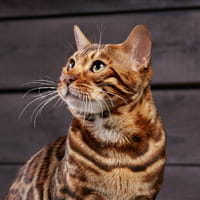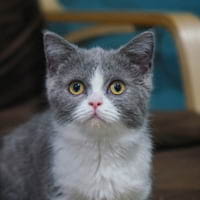Ragdoll insurance
Specialist pet insurance for cats and dogs
Specialist Ragdoll insurance from petGuard
Protect your Ragdoll with the right cover
Cuddly and affectionate, Ragdolls are a popular choice amongst owners with young families, or for those living on their own. Ragdolls love their human companions and, with a little effort, they can be trained to use their scratching posts or even to retrieve toys!

Over 20 years of Guardcover, supporting your passion
What's included in your Ragdoll insurance?
See how petGuard can protect you and your Ragdoll
20 Years of Experience
We know what it takes to protect the things that matter to you.
FirstVet
Free access to the FirstVet service 24/7 - 365 days a year.
Pay by interest free Direct Debit
Spread your payments across the year at no extra cost.
UK Customer Service
Our specialist team is ready to help with any questions you may have
Multi-pet Discount
If you have multiple pets insured with us, you will receive a multi-pet discount for each policy that you have on cover.
Specialist insurance for Ragdolls from petGuard
Why protect your Ragdoll with petGuard?
Our insurance for Ragdolls is designed to make things easier. Take a look at what we can do to ease some of the stress of looking after your Ragdoll.
-
Veterinary Fees
How does our vet cover work?
If your cat falls ill or has an accident, we know that veterinary treatment can be costly. To give you some financial security and peace of mind should the worst happen, we offer 3 levels of vet fees cover on our Accident and Illness policies. You can choose £3,000, £6,000 or even up to £12,000 of veterinary fees cover per year. This amount refreshes every year that you renew with us, providing you with continual cover for ongoing or chronic conditions.
-
Multi-pet Discount
Have more than one pet?
If you have multiple pets insured with us, you will receive a multi-pet discount for each policy that you have on cover.
-
Overseas Travel
Are you covered if you take your pet abroad?
Providing your pet complies with the Pet Travel Scheme (PETS), you can travel within Europe, the Channel Islands (consisting of the Bailiwick of Jersey and the Bailiwick of Guernsey), the Isle of Man and the Republic of Ireland with your pet as many times as you like, as long as your trip away lasts no longer than 60 days each time.
The cover includes up to £2,000 each policy term, towards the costs of kennelling your pet and getting new pet travel documents if your pet’s microchip fails or if your pet is put into quarantine due to illness.
Also included is up to £1,500 each policy term, if your pet needs emergency veterinary treatment, goes missing, you lose your pets travel documents or you have to re-worm your pet due to your original departure being delayed.
Some of the cat breeds that we cover
Find out which types of cat we cover
Frequently asked questions about Ragdoll insurance
Want to find out more about our Ragdoll insurance?
Got a question about our cover for your cat? Or want to know more about cats in general? We’ve answered a few questions for you here!
- Cat insurance
- Cover
- Travel
- How long do Ragdolls live for?
On average, Ragdolls can live for 12 to 15 years, but are prone to developing health issues, including, Hypertrophic Cardiomyopathy (HCM), Polycystic Kidney Disease (PKD) and Feline Infectious Peritonitis (FIP).
- Are Ragdolls hypoallergenic?
Unfortunately, Ragdolls are not bred to be hypoallergenic. This breed only has a small undercoat under their rather long top coat, which means that the severity of allergies is lessened, however, they can still cause issues for allergy sufferers. They will need regular grooming in order to keep their coat healthy and clean.
- Can Ragdolls go outside?
You can let your Ragdoll go outside, however, they are not the most out-door savvy of cats. Due to their docile and trusting nature, they can be fairly defenceless against other cats or larger animals. Keep an eye on them if they do venture outside or walk them on a lead so they don't wander off.
- What is cat insurance?
Cat insurance helps cover the cost of veterinary treatment if your cat falls ill or suffers an injury. Some cat insurance providers will also pay you a lump sum if your cat passes away, if they’re either lost or stolen, or if they cause damage to another person’s property.
- Is cat insurance worth it?
If your cat were to develop an ongoing health condition, the amount of money you would need to pay in vet bills could rise considerably. The question you need to ask yourself is, if my cat gets ill or injured long-term, how will I find the money to pay for all the treatment they need?
- Do I need cat insurance?
Cat insurance isn’t mandatory but may be worth considering. Think of it as a financial safety net that’s there to protect you against unexpected costs. After all, you never know when your cat could fall ill or suffer an injury.
The average pet insurance claim can be as much as £793, but that amount can run into the thousands if your cat were to develop an ongoing condition. Ultimately, you have to balance the cost of cat insurance premiums against the risk of incurring a hefty vet bill. But keep in mind that as your cat gets older, it may be more likely to fall ill, which in turn can raise the cost of your cat insurance.
- Do I need insurance for an indoor cat?
It’s easy to think that if you keep your cat indoors, then you’re protecting them from illness and injury. But that’s not always the case. Cats that spend too much time indoors can suffer with obesity, diabetes, urinary conditions and exposure to household toxins.
Like most animals, cats need to exercise for their physical health. Lack of exercise can lead to boredom and stress, which in turn can have a negative impact on your cat’s health. For example, if your cat is not getting enough exercise, they can start to put on weight. Just like humans, excess weight is harder to shed the older your cat gets.
Another big health risk in indoor cats is what’s known as Feline Lower Urinary Tract Disease , or FLUTD for short. FLUTD mostly occurs in older, overweight cats that don’t exercise enough, or that don’t consume enough fluids as part of their diet. If FLUTD is left unchecked, it can result in a urinary tract blockage, something that could be life-threatening to your cat.
So, whether you choose to keep your cat indoors or out, it’s worth thinking about getting cat insurance. Even if your cat stays mostly indoors, there’s always the possibility that they could fall ill.
- When can I get cat insurance?
Insurance for your cat can start as soon as possible! Our cover starts for cats and kittens aged eight weeks and over.
We cannot cover claims arising within the first 14 days of your insurance starting and pre-existing illnesses and conditions are not covered.
- How much is cat insurance?
There are various factors that can affect how much you pay for cat insurance. For example, protecting your cat on an accident only policy can keep the cost down. But there are other factors too, including:
Where you live
Veterinary treatment prices vary up and down the country. So, if you live somewhere where vet costs are higher, you can expect to pay more for your cat insurance.
How old your cat is
As you might expect, older cats are at a higher risk of developing a health problem. So, the older your cat the more expensive your cat insurance is likely to be.
What breed your cat is
If you own a pedigree cat, it’s likely you’ll have to pay more to insure it. Some cat breeds are more prone to certain illnesses, which again is likely to up your premiums.
- What do I need to think about before buying cat insurance?
Before you start looking for cat insurance you should think about:
Your cat's age
It can be harder to get cat insurance when your cat is older than eight years old, or younger than eight weeks old. At petGuard, we can start to provide cover for kittens aged over eight weeks old.
Pre-existing conditions
petGuard is unable to cover any pre-existing condition your cat might have.
- When should I get pet insurance for my cat?
You never know what’s around the corner. If your cat were to fall ill or get injured, could you cover the cost of the vet bill? If your cat is older and the illness or injury turned into a long-term condition, the costs could spiral. All things considered it might be best to cover your pet sooner rather than later. Just be aware that there are some restrictions around when you can get your pet insured. At petGuard, we can start to provide cover for cats aged over eight weeks old.
- Can I get cat insurance for pre-existing conditions?
Most cat insurance providers, including petGuard, are unable to cover your pet if they have a pre-existing medical condition.
- How long is a cat insurance policy valid for?
Standard cat insurance policies usually last for a 12-month period. After this time, you’ll need to renew your cover.
- What are some of the exclusions of petGuard cat insurance?
Your pet's age
We will not pay claims for any pet under eight weeks of age.
The use of your pet
We will not pay claims for any pet being used for breeding purposes.
Pre-existing conditions
We will not pay for any pre-existing conditions that have been investigated, treated or you have seen symptoms of before the start of your policy.
We will not pay claims under any section excluded on the policy wording. Click here to find out more.
- Is dental treatment covered?
Yes. Depending on the type of cover you select we are able to cover treatment provided that it is related to an injury or illness.
- Do you insure pets used for breeding?
No, we cannot provide cover for pets that are used for breeding. There are special policies for their specific risks, and we suggest you speak to your vet or local insurance broker for help finding suitable cover.
- Do you provide cover for chronic and ongoing veterinary conditions?
We offer a choice of three annual benefit levels. You can insure up to the chosen limit each year and provided that we are able to offer renewal and you renew without a gap in cover the benefit will be reinstated for the next period of insurance. This means that you can claim for chronic or ongoing conditions such as arthritis, diabetes, heart, or skin conditions whilst the policy remains in force.
- Do you only cover UK residents?
Yes. You must be a UK resident and domiciled in the UK.
- Is there an excess on this policy?
Yes there is an excess you will need to pay in respect of each illness or injury for which you wish to claim each year. These are as follows:
Veterinary Fees
For each illness or injury arising during each period of insurance your excess will be:
- For pets under eight years of age at time of treatment: The first £150.
- For pets older than eight years of age at time of treatment: The first £150 plus 20% of the remaining cost of treatment.
Holiday Cancellation - The first £75 of the claim
Accidental Damage to Third Party Property - The first £75 of the claim
Accidental Damage to Pet Accessories - The first £50 of the claim
Emergency Expenses - The first £50 of the claim
Third Party Liability - The first £250 of property damage claim
- What information do you need to start my cover?
We need some details about you and the pet you wish to insure together with either bank account or debit/credit card details for payment of the premium.
- How do you calculate premiums?
We look at a number of factors including the age and breed of the pet, the risk of chronic or recurring conditions associated with certain breeds, the area the pet lives in and any claims history.
- Can I downgrade my policy to a cheaper level of cover either mid-term or at renewal and benefit from continuous cover?
If you later find that your chosen cover no longer suits your needs, we cannot downgrade your policy to a different level during the policy term or at renewal. Cancelling your policy and starting a new one means your pet won't have continuous cover. Any past symptoms or conditions will be seen as pre-existing and won't be covered. Additionally, you can't claim for illnesses in the first 14 days of the new policy.
- How can I pay for my policy?
You can choose to pay in full by credit or debit card. Alternatively, you can take advantage of our interest free monthly payment option and simply spread the payments out, without any additional cost.
- Can you pay my vet directly?
This is something we are able to do provided that your vet is happy with this arrangement.
- Setting up a policy
As the insurance policy is a legal agreement between us and the policyholder, we can only set up a policy with the person who will be named as the policyholder.
- Can I travel with my cat or dog on a plane?
Most airlines will allow you to take a cat or dog on the plane, either in the cabin or down below in cargo. Before booking your flight, check with the airline that they can in fact, fly your pet. You may have to book in advance, with some airlines charging additional fees for traveling pets.
Your pet will need pet travel documents before they can fly, as this will need to be presented to the airline when checking in your pet. Depending on where your pet is flying from and where they are flying to, they will need to have certain vaccinations and treatments for illnesses such as rabies or tapeworm. You will most likely need to proof of the vaccinations and treatment from your vet.
- How should I prepare my cat or dog for traveling abroad?
If you're traveling abroad, or simply going away for a few days in the UK, it’s still a good idea to prep your pet for the journey. Such preparation measures could help reduce the stress levels in your pet, help you understand how best your pet travels, and help make the journey that little bit easier for both you and your pet.
- Before taking your pet on any long car journey, take them on short drives close to home, while slowly increasing the amount of time spent in the car. This will not only help them get used to being confined in a car, but it could help them overcome travel sickness if they suffer from it.
- Avoid feeding your cat or dog right before traveling, as the motion of the car, train or plane could upset their stomach. Make sure they have plenty of water, so they are well hydrated.
- Before any long journey, consider the health of your pet. Are they fit and healthy enough to travel? Make sure they are up to date with their vaccinations and treatments and be sure to check if they need any additional ones, as this could be a requirement of certain countries or airlines.
- To help ensure your pet is comfortable while traveling, make sure they have plenty of water, (food but depending how well they travel on a full stomach), toys to keep them occupied, and a comfortable place to sleep and rest. Most importantly, they need to be secured while traveling, whether it be in a crate that is large enough for them to sit in, stand and move around in, or strapped in using a proper pet seat belt for the car.
- What are the other alternatives to taking your pet on holiday?
If you don't want to take your cat or dog on holiday with you, then why not consider the following instead:
- Leave your pet with a friend or family member
- Have a qualified pet-sitter come around to your home, to feed, walk and check-up on your pet
- Take your pet to a reputable kennel or cattery
Making a claim with petGuard
We’ve made making a claim so easy
If something has happened to your pet, then we're very sorry to hear it. If you find yourself needing to make a claim against your policy, then we'll tell you what your next steps are and how you can get in touch with us.
1. How to make a claim
If you need to make a claim, then feel free to contact our UK-based claims team on: 01423 447 365
Alternatively you can email: petguardclaims@ncionline.co.uk
Find out how to make a claim on Third Party Liability cover, or if your policy started before 1st May 2024 here.
2. Next Steps
Once you have made a claim, we will keep you regularly updated by either text or email.
3. What if my claim is successful?
If your claim has been successful, then we can issue the claim payment to:
- Your bank account, using the same details that you have provided us with, so you aren't left out of pocket, or;
- Directly to your vet, if your vet is able to accept direct payments and this is easier for you.
Your policy document explorer
Your policy documents
The documents below apply to all pet insurance policies purchased from 1st May 2024 onwards.
Existing customers: If you purchased your policy before the date shown above, you can log into your account where you can view, amend, and renew your documents here. If you have not already signed up for an account, then you can register here.
For all policies with renewal dates after 13th May 2024, please find your policy documents below:



















